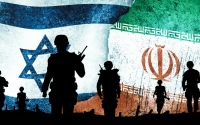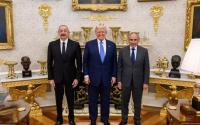14 January 2005
The other day I posted a Dahr Jamail piece entitled, Iraq: The Devastation, but another word has recently come to mind that, I suspect, might apply no less aptly to Iraq and other areas where the Bush administration is exerting its muscle. That word is "desolation."
Let's forget for a minute the recent Newsweek report that the Pentagon is considering funding 1980s El Salvador-style "death squads" in Iraq, an article which caused enough of a stir to be addressed both by the Secretary of Defense ("somebody has been reading too many spy novels and went off in flights of fancy, which I hope have been put to rest") and by the White House press spokesman; or the urge among administration hardliners to extend a failing war and occupation across a border in the next few weeks with strikes into Syria; or the fact, just revealed in a front-page New York Times piece that the "we don't torture" administration sent Condoleezza Rice on a special mission to Capitol Hill to oppose the imposition of Congressional restrictions on, and oversight of, what the two Times reporters politely call CIA "extreme interrogation measures." Instead, what stays in my mind is a single incident reported recently that caught for me the desolation the Bush administration is spreading in its wake: a desolation of place, of our military, of our values, of our language.
On January 7, an American plane dropped a 500-pound bomb on a house in a village near the northern Iraqi city of Mosul. The house, the military announced afterwards, was "not the intended target" in what was called "a cordon and search operation to capture an anti-Iraqi force cell leader." An argument promptly began as to whether, as the military claimed, 5 people had been killed or, as people on the ground claimed, 14 people, including 7 children. (This sort of argument has been a commonplace of such incidents in both Afghanistan and Iraq since 2001.) The military also issued an expression of regret -- and it was a phrase in that statement which still hangs desolately in my memory. The military announced that it "deeply regretted the loss of possibly innocent lives." Think of that. A 500-pound bomb hits what they themselves then believed not to be "the intended target" and what they regretted was the loss of "possibly innocent" lives. Was it simply assumed by now that so many Iraqis support the insurgency in areas like Mosul that even in the "wrong" house the odds of "innocence" were slim?
A homespun version of Iraqi desolation came my way recently via an e-mail sent in by an Iraqi exile from the Saddam years who is still in exile. She writes:
"I just finished reading Dahr Jamail's article about Iraq and thought I might add my personal account of the situation there. Here is what I heard from my family (in Baghdad) in the last few weeks:
"1. As of last week, they have only two hours of electricity for every ten hours of black-out.
"2. Several female hairdressing salons have been bombed and the others are threatened by the fanatics. The result: Most salons are now closed for business.
"3. Male barbers were also given warnings not to do specific hair styles only God knows why!!
"4. One of my sister's friends has been killed because he failed to stop at an American checkpoint. It was a bit dark and his eyesight wasn't 100%. In his panic he just rushed past the checkpoint. It is one of the tragedies that are occurring every day and have been since the start of the war. The reason is so simple; no one educated the soldiers that the Iraqi, when faced with such a situation, accelerates instead of stopping. This habit had been instilled in the Iraqi mind during the terrorizing years of [Saddam Hussein's] dictatorship. The last thing anyone would want was to be caught up at a checkpoint because this could lead to prison and possibly death, regardless of whether he/she was involved in anything suspicious. All that was needed was for someone to be in the wrong place at the wrong time.
"Unfortunately, I learned that the hard way when my husband was arrested at such a checkpoint. He was released one month later after the intelligence forces were satisfied he wasn't involved in anything suspicious, but in that month he had gone through some horrible experiences, which to this day he refuses to talk about (even to me), and which still haunt his nights."
Of course, there is now nothing more literally desolate in Iraq than the Carthage we've created in Falluja about which Michael Schwartz has much more to say. Tom
Falluja
City Without a Future?By Michael SchwartzIn November, after three weeks of "precision" bombing, 10,000 American soldiers and 2,000 Iraqi national guards marched into Falluja. They had five goals:
First and foremost, free Falluja from the grip of the insurgents and allow its citizens to participate in the January 30 elections;
Second, kill or capture the guerrilla leadership in its "safe haven," particularly Abdul Musab al-Zarqawi, the accused mastermind of the resistance;
Third, "so damage the insurgency" that it would be reduced to "containable levels through 2005";
Fourth, teach Fallujans (and the rest of Iraq) that "harboring" the mujaheddin resistance would provoke the full force of the American military. (On this point, an anonymous Pentagon official told New York Times reporters Thom Shanker and Eric Schmitt: "If there are civilians dying in connection with these attacks, and with the destruction, the locals at some point have to make a decision. Do they want to harbor the insurgents and suffer the consequences that come with that, or do they want to get rid of the insurgents and have the benefits of not having them there?");
Fifth, rebuild Falluja, now cleared of guerrillas, as a showcase for the rest of the country to admire and emulate. (As Colonel John R. Ballard, a military planner, told the New York Times "The best place to bring a model town into place is Falluja.'')
Did the attack on Falluja accomplish these ambitious goals?
"Suffering the consequences"
Unfortunately, the only success in the Fallujan campaign so far has been in demonstrating "the consequences" that would accrue to cities that harbored guerrillas. Falluja was gutted. Two months after the invasion, Erik Eckholm of the New York Times described the city as "a desolate world of skeletal buildings, tank-blasted homes, weeping power lines and severed palm trees." At least a quarter of its homes were fully destroyed, and virtually all the others were severely damaged. Blown out windows, wrecked furniture, three-foot blast holes in walls, and disintegrated doors demonstrated that American troops had relentlessly applied what they jokingly called the "FISH" strategy (Fighting in Someone's House), which involved "throwing a hand grenade into each room before checking it for unfriendlies." Since (in the words of Lt. Gen. Sattler) "each and every house" was searched, very few remained livable.
The civilians who stayed during the fighting found themselves in a kill-anything-that-moves free-fire zone. When the first medical teams arrived in January they collected more than 700 unburied and rotting bodies (reputedly including those of 550 women and children) in only one-third of the city; and these obviously didn't include the dead already buried during the battle or hidden under the debris. (As Al Jazeera put it, "the smell of corpses inside charred buildings pervades the atmosphere.") If the 2,000 kills claimed by U.S. forces are accurate, that means that no fewer than 3000 people (1% of the city's estimated pre-campaign population) died; the real figure is undoubtedly far higher.
But what of those who survived? More than 200,000 residents are estimated to have fled the battle, many without even a change of clothes, just as the Iraqi winter set in. The lucky ones crowded into the homes of friends and relatives, sometimes as many as 30 people to a small apartment. The unlucky ones created ad hoc refugee camps virtually anywhere they could squat, mostly without any facilities at all to call on. One family set up a tent in the bumper-car arena of an abandoned amusement park. (At least there was a roof.) Independent journalist Dahr Jamail reported that their daily life consisted of "searching for food, medical attention, warmth and clean water." One refugee told Jamail, "We are living like dogs and the kids do not have enough clothes." Another vividly described the lack of food in terms of the normal post-Ramadan feasting this way: "We did not feel that there is Eid after Ramadan this year because of our situation being so bad. All we have is more fasting." The American occupation forces and the Iraqi Interim Government offered no help to these "invisible" victims, certainly underscoring, whether purposely or not, the "consequences" to be visited on those who harbored guerrillas.
A senior Bush administration official had predicted to a New York Times reporter that Fallujans would respond to the onslaught by saying, "O.K. No más! What do we do about this? How do we work with you, Prime Minister Allawi, to try to stop this kind of warfare."
But instead of saying "No más," the Fallujans have evidently been infuriated, with thousands demonstrating at the gates of the city, demanding that the U.S. leave. Others favored international intervention to stop the assault: "I would like to ask the whole world -- why is this? I tell the presidents of the Arab and Muslim countries to wake up! Wake up please! We are being killed, we are refugees from our houses, our children have nothing -- not even shoes to wear! Wake up! Wake up! Stop being traitors! Be human beings and not the dummies of the Americans!"
And the anger extended far beyond Falluja. In Ramadi, 40 year old Abdulla Rahnan concluded, "The Americans want every city in Iraq to be like Fallujah. They want to kill us all -- they are freeing us of our lives!" His friend contributed his own grim observation: "Everyone here hates them because they are making mass graves faster than even Saddam!"
Were the guerrillas at least demobilized by the offensive? In mid-November, Lt. Gen. John Sattler, commander of the Marines in Falluja, affirmed the campaign's success, telling reporters that the attack had "broken the back of the insurgency…. I personally believe, across the country, this is going to make it very hard for them to operate."
He was wrong. Abdul Musab al-Zarqawi (if he was ever in Falluja) left the city long before the attack with virtually all of the other guerrilla leaders. The vast majority of the fighters evacuated with the residents, evidently leaving behind a relatively small force of guerrillas, who used classic hit-and-run tactics to inflict as much harm on the Americans as they could. While many sacrificed their lives, others escaped through tunnels and the rubble, and then returned to attack again and again. After eight weeks of this, one leader who remained taunted the occupation by conducting a cell-phone interview with Washington Post reporter Anthony Shadid from inside the city, claiming the fighting "would continue for months."
And while the Americans were tied down in Falluja, the guerrillas mounted a huge offensive throughout the Sunni areas of Iraq. They reversed American offensives in Tal Afar and Samarra; seized the initiative in Mosul and Tikrit (previously showcases for the occupation authorities); challenged American control in many neighborhoods of Baghdad; regularly shelled the American headquarters in the capital's "Green Zone"; and escalated their attacks against American bases. In November, one in four American supply convoys was ambushed, forcing the military to turn increasingly to airlifts to transport supplies.
In December, Lt. Gen. Lance Smith, the deputy chief of the U.S. Central command, conceded that the insurgency was "becoming more effective." In early January, the Iraqi intelligence chief announced that four predominantly Sunni provinces (including Baghdad), holding 40% of the Iraqi population, were now considered "unsafe" -- that is, they were the sites of ongoing battles between mujaheddin and American soldiers.
Instead of crushing the insurgency, the attack on Falluja seems only to have increased its depth and scope, while adding to its support.
Clearing Falluja
As the U.S. military destroyed Falluja, they found they could not even fully subdue the resistance inside the city. Though the invading force advanced quickly from one end of Falluja to the other and made early declarations of victory, low-level fighting continued through December and into January.
Both sides claimed the advantage in these ongoing battles. The mujaheddin, armed with satellite telephones and internet connections (and even English-language outlets like Jihad Unspun), issued press releases claiming victory after victory, under headlines like "US Pulls Back From Parts of Fallujah," The American media, in the meantime, declared that the city was quiet -- except for "occasional firefights and sniping."
The underlying reality was a classic, low-level urban guerrilla war in the rubble, with the guerrillas standing and fighting only when they thought they could inflict modest damage, and the U.S. responding with overwhelming force -- tanks, artillery, and bombing runs -- against any building from which they received fire. Whether these encounters were occasional or frequent, whether the Americans or the insurgents regularly prevailed, the result was certainly an ongoing struggle. A January UN dispatch reported that only nine of 27 neighborhoods were safe enough for medical teams to enter; and that reporters were not being permitted in the city "for their own safety." A Los Angeles Times report referred just to "occasional firefights" in the city, but then declared that "only certain parts of Fallouja are considered safe enough for residents to return" and that temporary U.S. bases within the city bore signs with the peculiar but unambiguous warning: "STOP Or U.S. Military Will Shoot Fire."
A sense of the ongoing fighting is reflected in a report from a refugee describing his first and only night back in the city ("Report from Falluja Refugee Camp," Free Speech Radio News, Jan. 6, 2005): "The houses around mine have all been destroyed. Our house was full of smoke. It was a mess. We cleaned up the house and spent the night there. But the bombing started at seven in the evening and lasted until the morning. There were all sorts of bombs. My children could not sleep." Because there was "no real end of the fighting in sight," they chose to leave once again and focus on "day-to-day survival" as refugees.
Since the rubblized terrain that is now Falluja can probably hide guerrillas indefinitely, the fighting might only end with an American withdrawal. In the meantime, with so many front-line troops fighting in, or occupying Falluja, the American military has only been able to mount half-hearted responses to insurgent efforts elsewhere, while remaining vulnerable to IEDs planted along convoy and patrol routes, to the mortaring of bases and of the Green Zone, and to suicide attacks like the one at the army mess hall in Mosul.
The Meaningless Election?
By January, reality had made a mockery of the pre-attack Bush administration mantra that U.S. troops would make Falluja "safe for the election." A tiny trickle of residents weathered the five-hour wait at U.S. checkpoints to return to an unlivable city still at war. And most of them left again after inspecting their destroyed neighborhoods. At least 90% of Fallujans were sure to be non-voting refugees when the election arrived.
But to say that the attack on Falluja definitively disfranchised Fallujans would be to ignore the much larger reality: that elections cannot be held in most of Sunni Iraq. It was not just that very few voters had registered in either Mosul or Anbar province; nor that the Interim Security Secretary had warned that safety concerns might preclude elections in the four majority-Sunni provinces; nor that there were few functioning voter registration centers (and those were targeted by guerrillas); nor that the whole election commission in Anbar province had resigned, claiming that it was not worth risking their lives when elections were impossible.
The most significant factor was that a large proportion -- likely a majority -- of Fallujans and other Sunnis believed the election to be a cruel charade in which they were being asked to choose which group of quislings would administer American policy. Riverbend, the pseudonymous young Sunni woman whose website has become required reading for those concerned with Iraq, expressed this sentiment elegantly at the beginning of January:
"Sunni Arabs are going to boycott elections. It's not about religion or fatwas or any of that so much as the principle of holding elections while you are under occupation. People don't really sense that this is the first stepping stone to democracy, as western media is implying. Many people sense that this is just the final act of a really bad play. It's the tying of the ribbon on the 'democracy parcel' we've been handed. It's being stuck with an occupation government that has been labeled 'legitimate' through elections."
Without the Sunni vote, a new regime would be visibly unrepresentative, another nail in the coffin of a government whose existence would continue to depend on 150,000 foreign troops.
The False Promise of Reconstruction
Even before the attack, the U.S. promised that a newly liberated Falluja would be spectacularly reconstructed -- "a feat of social and physical engineering… intended to transform a bastion of militant anti-Americanism into a benevolent and functional metropolis." But actions always speak louder than words, and six weeks after declaring victory the only new construction in the city consisted of a series of checkpoints (where soldiers recorded the fingerprints and retina scans of returning residents), and the newly bulldozed main streets (whose use was restricted to U.S. military vehicles). This police-state approach reflected what Charles Hess, the Director of the Iraq Project and Contracting Office and the man in charge of the city's reconstruction, called a "near term…focus on operational security measures."
But the deepest tragedy lay not in the "near term," but in the near certainty that the promised reconstruction will never take place, simply because the Bush administration is unlikely ever to allocate the massive resources needed for such an undertaking. The monetary commitment cited by U.S. officials escalated from a pre-attack $50 million to an early January estimate of $230 million. But this figure, which Hess claimed to be adequate for the job, is actually a fraction of what would needed to recreate a modestly working city and a minuscule proportion of the total required to create "a benevolent and functional metropolis."
The inadequacy of allocation can be judged by considering infrastructure repairs. Based on the estimated $400 million cost of repairing the less disastrously damaged Sadr City water systems in Baghdad, the repair of Falluja's sewers and treatment plants would in itself surely exhaust the entire $230 million allocation being discussed. The electrical system, which needed to be "ripped out and rebuilt from scratch," would cost at least as much as the sewers. Rejuvenating the medical system, rebuilding the schools, and clearing and rebuilding the streets, would likely claim another $100 million or more each.
And that's without even considering housing repair. The Iraqi Interim Government promised families from $2000 to $10,000 for each damaged dwelling. With 12,000 to 20,000 of the 50,000 homes in Falluja effectively demolished, this added up to yet another $200 million promise, with another $100 million needed to meet the government's promises to shop owners.
And remember that Falluja, the "city of mosques," now has had an unknown but significant number of its 100 or so mosques more or less annihilated, and well over half damaged. Christian Parenti, a knowledgeable independent reporter, estimated that just two of the mosques would require some $80 million in repairs; the full bill might therefore exceed $1 billion.
Total this up and you discover that the promised allocation for the reconstruction of Falluja is at least $2 billion less than would reasonably be needed. And, given the record of reconstruction funds released by the Americans over the last year, even the $230 million is certainly in question.
In other words, the promise of a "benevolent and functional metropolis" could be seen, at best, as a cruel hoax, vitiated only slightly by the fact that Fallujans never believed it.
"We Destroyed Everything"
If the American occupation authorities have their way, Falluja may remain a wasteland until the resistance is subdued. The promises of freedom, elections, and a benevolent metropolis were all empty ones. Even Charles Hess, in charge of reconstruction, admitted in December that "little reconstruction has been done" in either Najaf or Samarra, the predecessor beneficiaries of a similar style of American liberation. And Falluja, seen as more hostile territory than either of the other two cities, may not even have their "luck."
Many of the recently returning refugees heard or saw battles from the checkpoints and retreated without entering the city. Others viewed their damaged or destroyed homes and then left. Still others stayed one night and then chose a homeless odyssey over residence in what was left of their city.
But a few stayed, and they will try to begin the process of rebuilding. And herein lies the greatest tragedy of all. The miracle of the human spirit can (and eventually will) redeem even so desolate a wasteland. But this redemption must wait, because the presence of the U.S. military -- with its retina scans, its prohibition on all non-military vehicles inside city limits, its constant surveillance, its threats of and use of deadly force, its monopoly over all resources and, most of all, its quixotic effort to subdue the resistance -- makes even the beginning of reconstruction impossible.
Derrick Anthony, a 21 year-old Navy Corpsman surveyed the desolate Falluja landscape and commented, "It's kind of bad we destroyed everything, but at least we gave them a chance for a new start."
He was wrong. Reconstruction will only begin when the Americans leave.
Michael Schwartz, Professor of Sociology at the State University of New York at Stony Brook has written extensively on popular protest and insurgency, and on American business and government dynamics. His work on Iraq has appeared at Asia Times, and ZNet and in Contexts and Z Magazine. He is a regular contributor to Tomdispatch. His books include Radical Politics and Social Structure, The Power Structure of American Business (with Beth Mintz), and Social Policy and the Conservative Agenda (edited, with Clarence Lo). His email address is [email protected].






